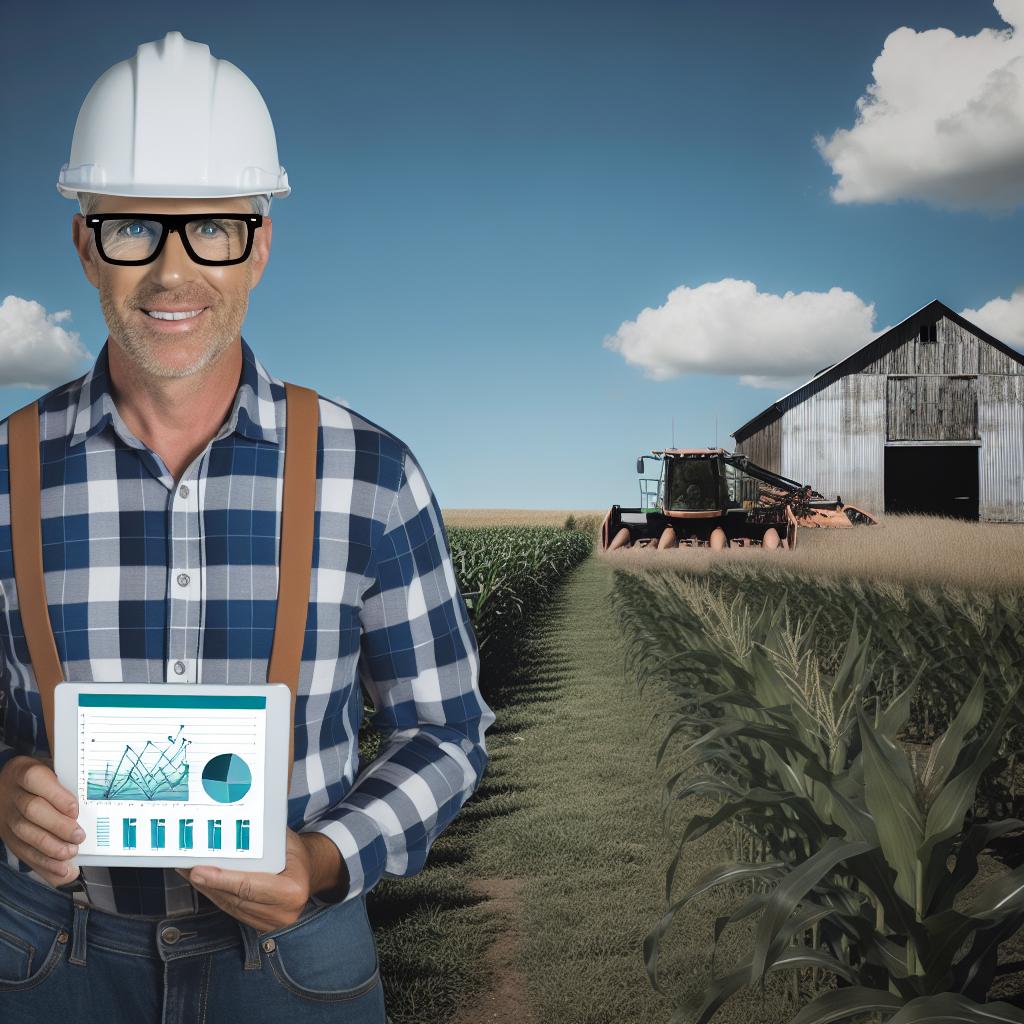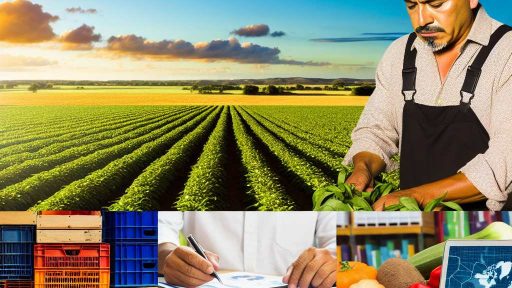Introduction to Supply Chain Optimization in Agriculture
Supply chain optimization plays a crucial role in modern agriculture.
This process enhances efficiency and reduces costs in farm operations.
Every stakeholder, from farmers to distributors, benefits from optimization.
Moreover, it helps meet the increasing global demand for food.
Understanding Supply Chain Dynamics
The supply chain in agriculture involves various stages.
It starts with production and moves through processing and distribution.
Each stage impacts the overall efficiency of the farming operation.
Understanding these dynamics is essential for successful optimization.
Identifying Key Challenges
Many farmers face challenges in managing supply chains effectively.
Issues such as fluctuating prices and market demands complicate operations.
Additionally, transportation delays can lead to spoilage of products.
Identifying these challenges is the first step toward finding solutions.
Benefits of Supply Chain Optimization
Optimization can significantly reduce operational costs for farms.
It improves resource allocation and decreases waste.
Furthermore, optimized supply chains enhance product quality and freshness.
Transform Your Agribusiness
Unlock your farm's potential with expert advice tailored to your needs. Get actionable steps that drive real results.
Get StartedUltimately, farmers can achieve higher profitability through effective strategies.
Implementing Optimization Strategies
Several strategies can improve supply chain performance in agriculture.
Farmers should adopt technology to streamline operations.
Utilizing data analytics can reveal patterns and insights.
Collaboration among stakeholders can also enhance efficiency.
Ultimately, a comprehensive approach leads to sustainable outcomes.
Future Directions in Supply Chain Optimization
The future of agriculture includes increasing reliance on technology.
Emerging technologies will continue to reshape supply chains.
For example, blockchain can enhance transparency and traceability.
Moreover, artificial intelligence will optimize decision-making processes.
Farmers willing to adapt will thrive in a competitive market.
Importance of Effective Supply Chain Management for Farms
Enhancing Efficiency
Effective supply chain management streamlines farm operations.
It reduces waste and optimizes resource use.
This approach saves time and minimizes costs.
Moreover, efficient practices enhance productivity levels.
Improving Profitability
Good supply chain management directly impacts profitability.
Farms can benefit from reduced operational costs.
Additionally, effective inventory management ensures better cash flow.
This allows farms to invest in growth opportunities.
Responding to Market Demands
Supply chains must be agile to adapt to market changes.
Farms can respond swiftly to shifting consumer preferences.
This responsiveness helps maintain competitive advantage.
Moreover, timely deliveries enhance customer satisfaction.
Building Strong Relationships
Successful supply chain management fosters collaboration.
Showcase Your Farming Business
Publish your professional farming services profile on our blog for a one-time fee of $200 and reach a dedicated audience of farmers and agribusiness owners.
Publish Your ProfileFarmers can build relationships with suppliers and distributors.
These partnerships lead to improved negotiation terms.
Strong relationships create a reliable support network.
Implementing Technology
Technology plays a crucial role in supply chain management.
Farms can leverage data analytics for better decision-making.
Automation improves efficiency and reduces human error.
Investing in technology yields long-term benefits for operations.
Ensuring Sustainability
Effective supply chains contribute to sustainable farming practices.
They promote responsible resource management and waste reduction.
Furthermore, sustainable practices appeal to eco-conscious consumers.
This alignment with consumer values can boost sales.
Key Components of Farm Supply Chain Optimization
Understanding Farm Supply Chains
Farm supply chains involve various interconnected elements.
These elements include producers, suppliers, distributors, and customers.
Streamlining these connections enhances overall productivity.
Effective organization promotes timely delivery of resources.
Demand Forecasting
Accurate demand forecasting helps farmers meet market needs.
Producers can optimize planting schedules based on forecasts.
This practice reduces waste and maximizes profits.
Technological tools improve the accuracy of forecasts over time.
Inventory Management
Efficient inventory management minimizes excess stock on farms.
Farmers must track inventory levels closely to avoid shortages.
Implementing automated systems can streamline this process.
Regular audits ensure inventory aligns with current demand.
Supplier Relationships
Strong supplier relationships are essential for reliable inputs.
Engaging in long-term contracts can secure better pricing.
Farmers should assess multiple suppliers to ensure quality.
Building trust fosters smoother transactions and prompt deliveries.
Logistics and Distribution
Optimal logistics strategies enhance product distribution efficiency.
Farmers can use routing software to optimize transport routes.
This approach reduces fuel costs and delivery times.
Collaborating with distributors can increase market access.
Technological Integration
Integrating technology is crucial for modern farm operations.
Farm management software provides real-time data for decision-making.
Using drones or sensors can improve crop monitoring practices.
Embracing innovation results in better yield and efficiency.
Continuous Improvement
Farm operations should focus on continuous improvement strategies.
Regularly analyzing supply chain processes reveals areas for enhancement.
Adopting best practices boosts overall farm effectiveness.
Feedback loops enable farmers to adapt their strategies accordingly.
Discover More: Renewable Energy Solutions In Sustainable Farming
Showcase Your Farming Business
Publish your professional farming services profile on our blog for a one-time fee of $200 and reach a dedicated audience of farmers and agribusiness owners.
Publish Your ProfileChallenges Faced in Integrating Supply Chain Optimization
Resistance to Change
One major challenge is the resistance to change within farm operations.
Farmers often adhere to traditional methods.
Moreover, they may be skeptical of new technologies.
Overcoming this mindset requires education and effective communication.
Data Management Issues
Managing data effectively is crucial yet challenging.
Farm operations often rely on disparate data sources.
This inconsistency can lead to poor decision-making.
Additionally, many farms lack the tools to analyze their data.
Implementing integrated systems can alleviate these issues.
Resource Limitations
Resource limitations can hinder successful integration.
Small farms may lack the financial capability for new technologies.
Moreover, there is often a shortage of skilled personnel.
Investing in workforce training can help address this gap.
Supply Chain Complexity
The supply chain for agriculture is inherently complex.
Diverse stakeholders can complicate coordination efforts.
Additionally, unexpected events can disrupt supply chains.
Flexibility in planning is essential to mitigate these issues.
Regulatory Constraints
Navigating regulatory requirements poses significant challenges.
Agricultural regulations can vary widely by region.
Keeping up with changes can overwhelm farm operators.
Collaboration with regulatory bodies may provide guidance.
Find Out More: Enhancing Crop Protection Through Innovative Strategies
Technological Tools and Innovations for Supply Chain Efficiency
Importance of Technology in Supply Chain
Technology plays a crucial role in modern supply chains.
It enhances communication between farmers and suppliers.
Moreover, technology streamlines operations and reduces costs.
Using tech solutions improves decision-making capabilities.
Data Analytics and Management Systems
Data analytics helps farmers seek insights into their operations.
Farmers can track inventory levels more accurately.
These systems can predict trends and optimize resources.
Additionally, data management systems improve efficiency.
Farmers can analyze data to identify bottlenecks and issues.
Case Study: GreenFields Farms
GreenFields Farms implemented an advanced analytics system.
Their data platform streamlined supply chain operations significantly.
As a result, they reduced waste by 20% in one season.
Automation in Farm Operations
Automation is revolutionizing farm management practices.
Tools like drones enhance crop monitoring and assessment.
Robotic systems can perform repetitive tasks more efficiently.
Automated irrigation ensures optimal water usage.
Benefits of Automation
- Reduces labor costs significantly.
- Improves precision in farming activities.
- Increases productivity through timely interventions.
Blockchain for Transparency
Blockchain technology ensures transparency in the supply chain.
This system enables traceability from farm to consumer.
Showcase Your Farming Business
Publish your professional farming services profile on our blog for a one-time fee of $200 and reach a dedicated audience of farmers and agribusiness owners.
Publish Your ProfileEach transaction is recorded securely and immutably.
Consumers gain trust through verified sourcing practices.
Implementation Challenges
Adopting blockchain requires a cultural shift within organizations.
Additionally, integration with existing systems poses challenges.
However, the long-term benefits often outweigh the initial hurdles.
Future Trends in Supply Chain Optimization
Emerging technologies will continue to shape the industry.
Artificial intelligence and machine learning will enhance forecasting.
Moreover, increased connectivity will make operations more flexible.
Farmers should stay updated to leverage these innovations.
Uncover the Details: Maximizing Profits Through Efficient Farm Financial Management Practices

Case Studies: Successful Supply Chain Optimization in Farming
FarmTech Innovations
FarmTech Innovations implemented a new logistics strategy.
Their focus aimed at reducing transportation times.
By adopting real-time tracking, they improved efficiency.
This technology reduced waste and increased profits.
The case shows significant cost savings achieved.
Green Valley Farms
Green Valley Farms streamlined their inventory management.
They utilized data analytics for better forecasting.
This move minimized overstocking and understocking issues.
As a result, they improved their cash flow significantly.
This enhancement led to a boost in overall productivity.
Sunny Acres Organic Co-op
Sunny Acres focused on partnerships with local suppliers.
This strategy shortened their supply chain considerably.
By working closely with farmers, they ensured fresh produce.
Customer satisfaction improved, leading to increased sales.
Such initiatives highlight the importance of collaboration.
Harvest Moon Farms
Harvest Moon Farms adopted automated processes in harvesting.
They invested in machinery that optimized labor efficiency.
This automation allowed timely harvests and reduced spoilage.
The farm recorded a noticeable increase in their yield.
Automation showcases a forward-thinking approach to farming.
Riverbend Agricultural Solutions
Riverbend Agricultural Solutions integrated sustainability into their practices.
They focused on reducing waste in their supply processes.
Implementing these changes attracted environmentally conscious consumers.
This shift not only improved their brand image but profits.
It emphasizes the value of sustainable practices in farming.
See Related Content: Integrating Precision Agriculture for Sustainable Farm Management
Impact of Regulations on Farm Supply Chains
Overview of Regulatory Frameworks
Regulations significantly influence farm supply chains.
They encompass local, national, and international standards.
Farmers must comply with health, safety, and environmental guidelines.
Moreover, regulations often adapt to changing societal expectations.
Showcase Your Farming Business
Publish your professional farming services profile on our blog for a one-time fee of $200 and reach a dedicated audience of farmers and agribusiness owners.
Publish Your ProfileCompliance Costs and Challenges
Meeting regulatory requirements incurs substantial costs for farmers.
These costs can include hiring consultants and attending training sessions.
Additionally, small farms may struggle to comply with extensive regulations.
Consequently, large farms might find it easier to absorb these costs.
Impact on Supply Chain Efficiency
Regulatory compliance can slow down farm operations.
For example, inspections may disrupt planting and harvesting schedules.
Furthermore, delays in obtaining permits can hinder timely operations.
This inefficiency may lead to lost profits and wasted resources.
Environmental Regulations and Sustainability
Environmental regulations push farms towards sustainable practices.
They encourage the use of eco-friendly products and techniques.
Compliance with these regulations fosters innovation within the industry.
Farmers increasingly adopt practices that protect natural resources.
Market Access and International Trade
Regulations affect access to both local and international markets.
Adhering to regulations can open doors to profitable markets.
Conversely, non-compliance may lead to export restrictions.
This situation compels farmers to stay informed about global standards.
The Role of Technology in Compliance
Farmers leverage technology to meet regulatory demands efficiently.
For instance, software solutions streamline documentation processes.
Furthermore, technologies like drones monitor crop health and compliance.
These innovations help farmers maintain standards while reducing labor costs.
Future Trends in Agricultural Regulations
The trend towards stricter regulations will likely continue.
Farmers must anticipate changes and adapt quickly.
Additionally, advocacy for fair regulations is crucial for farm viability.
Engagement with policymakers helps shape future regulations positively.
Future Trends: Sustainable Practices in Supply Chain Optimization
Embracing Sustainable Farming Techniques
Sustainable farming techniques are revolutionizing the agricultural sector.
Farmers are adopting practices that enhance resource efficiency.
This approach reduces waste and minimizes environmental impact.
Moreover, crop rotation and cover cropping improve soil health.
Utilizing Renewable Resources
Renewable resources play a critical role in supply chain optimization.
Farmers are increasingly harnessing solar and wind energy.
This shift reduces dependency on fossil fuels.
Consequently, it lowers greenhouse gas emissions across operations.
Implementing Precision Agriculture
Precision agriculture enhances farming efficiency and sustainability.
Farmers use technology to monitor crop health and soil conditions.
This data-driven approach leads to informed decision-making.
As a result, input costs decrease while yields increase.
Adopting Circular Economy Principles
Implementing circular economy principles significantly benefits supply chains.
This system encourages waste recycling and resource reuse.
Farmers create closed-loop systems to minimize waste production.
Moreover, composting reduces landfill contributions.
Showcase Your Farming Business
Publish your professional farming services profile on our blog for a one-time fee of $200 and reach a dedicated audience of farmers and agribusiness owners.
Publish Your ProfileEnhancing Local Supply Chains
Local supply chains foster sustainable food systems.
Shortening the distance from farm to consumer minimizes transportation emissions.
Additionally, it strengthens local economies and communities.
Farmers prioritize partnerships with nearby distributors and retailers.
Integrating Technology and Data Analytics
Technology integration transforms supply chain management.
Farmers utilize data analytics to optimize their operations.
This practice enhances forecasting and inventory management.
Furthermore, it supports transparency throughout the supply chain.
Strengthening Consumer Education
Educating consumers about sustainable practices is vital.
Informed customers are more likely to support sustainable products.
This shift creates a demand for eco-friendly farming practices.
Consequently, businesses see increased sales of sustainable goods.
Additional Resources
From Supply Push to Demand Pull: Agribusiness Strategies for …




